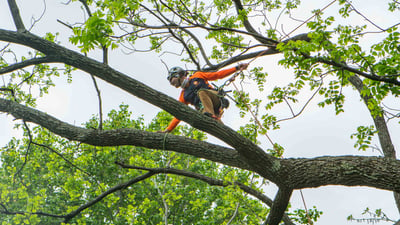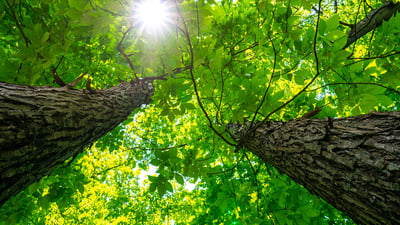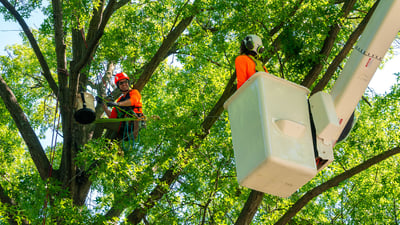

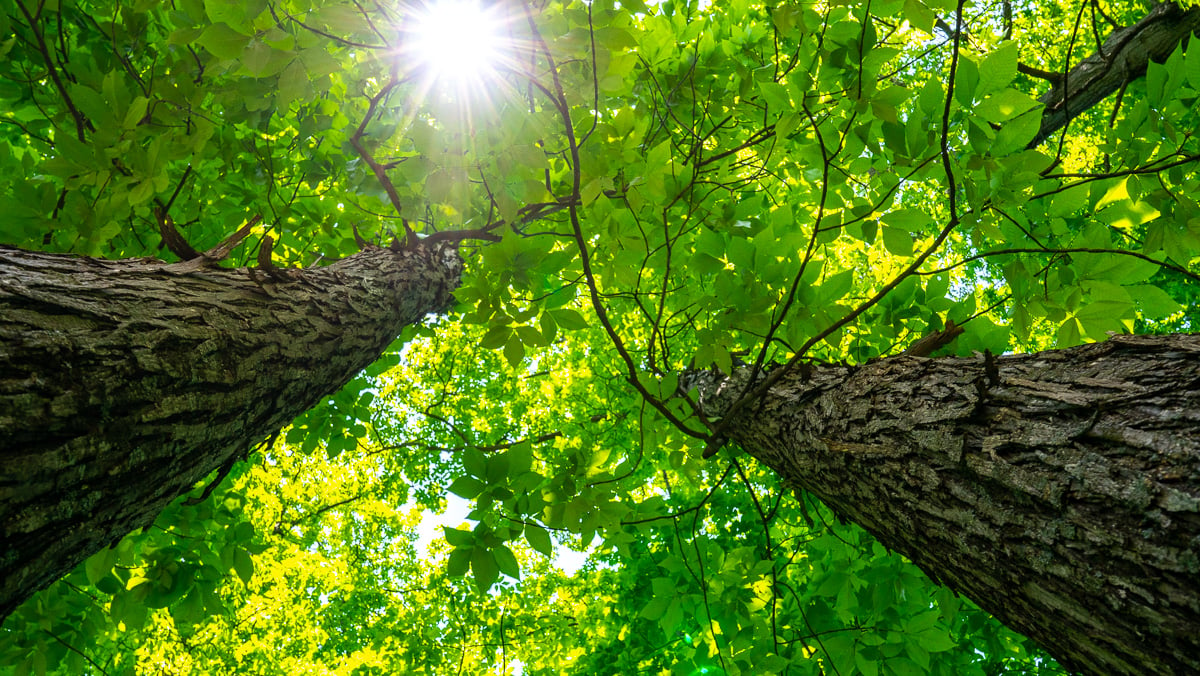
The trees on your Louisville, KY property are valuable to you in many ways. They provide tangible benefits like shade, privacy screening, increased property value, aesthetic appeal, and wind screening. They also likely have important meaning to you. The trees on residential properties often become the backdrops to many memories and experiences.
For these reasons, you want to practice good tree care in Kentucky. People are often surprised to learn that there’s quite a bit involved in properly caring for trees. Trees in the residential landscape are not self-sustaining the way that they would be in a forest. A healthy tree requires essential services like pruning, fertilization, watering, and more.
In this guide, we’ll cover everything that you need to know about tree care in Louisville. With the right knowledge, tree health does not have to feel elusive. You’ll know exactly what your trees need to succeed.
Understanding Your Tree’s Biology and Needs
Choosing and Planting the Right Trees for Your Yard
Basic Tree Care: The Essentials to Keeping Your Trees Healthy
Seasonal Tree Care in Louisville
Managing Pests and Diseases: Protect Your Trees
Advanced Care: Taking Your Tree Health to the Next Level
The Importance of Professional Tree Care Services
How to Choose a Tree Care Service in Louisville, KY
Trees require light, nutrients, and water to survive. In the natural forest setting, these things are available to them and trees are largely self-sustaining.
However, in the residential landscape, it’s a whole different ball game. The soil that your trees are growing in is likely lacking in nutrients. One reason for this is the fact that fallen leaves in the forest become a source of nutrients. They decompose and restock the soil with what’s been depleted.
However, in the residential landscape, we clean up leaves (and for good reason). Leaves left lying on the lawn can end up blocking your lawn’s access to sunlight (and killing it). Fallen leaves can also become a habitat for critters and invite new problems to your property.
Trees in the residential landscape can also be under extra stress and might require supplemental watering and pruning. While a limb that falls in the forest is likely to drop without problems, you can’t risk any falling limbs at your home.
All this to say, it’s important to keep an eye on tree health and make sure your trees are getting what they need. With proper tree care in Louisville, KY, you can have thriving trees that provide valuable benefits for years to come.

Now that you understand some of the basic biological needs of your tree, you’ll understand that if they aren’t being met, your tree might start to struggle. Along with that, trees also face potential problems like tree diseases and pests that can wreak havoc on their health.
You might be wondering how to tell if a tree is healthy.
Unfortunately, it’s not uncommon for signs of trouble to go unnoticed. It often takes a close examination by a professional to spot issues early.
Often, by the time a homeowner notices something is wrong with their tree, the problem has been festering for a while. This is a key reason why working with professional arborists in Louisville is so valuable. That’s a point we’ll dive more into as we go along.
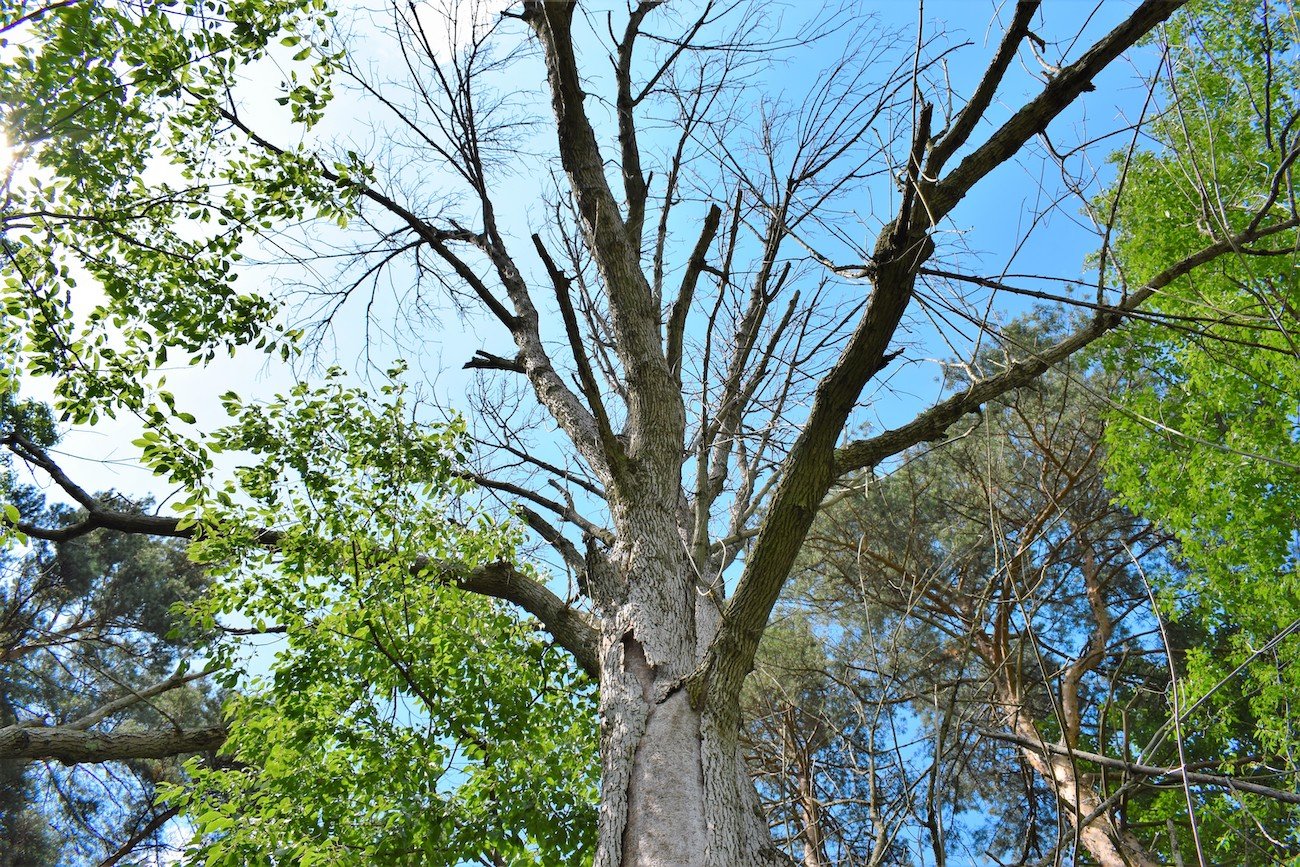
Before we delve more deeply into tree care in Louisville, KY, let’s talk about the importance of choosing wisely when you plant trees. So often, the success of your tree health hinges on this installation process.
We have some Louisville tree-planting tips to help set you up for success.
First and foremost, make sure that you put thought into where you want to plant the tree. As a general rule, trees are either small, medium, or large. Here’s what to keep in mind with each.
It’s important to think of the full growth of the tree (even if that is years down the road) and what structures are nearby.
You can also consider personal preference factors such as whether the tree has colorful leaves or blooms, will provide shade, and what other functions it might serve. We are fortunate that here in Louisville, we have many trees that can grow and thrive beautifully.
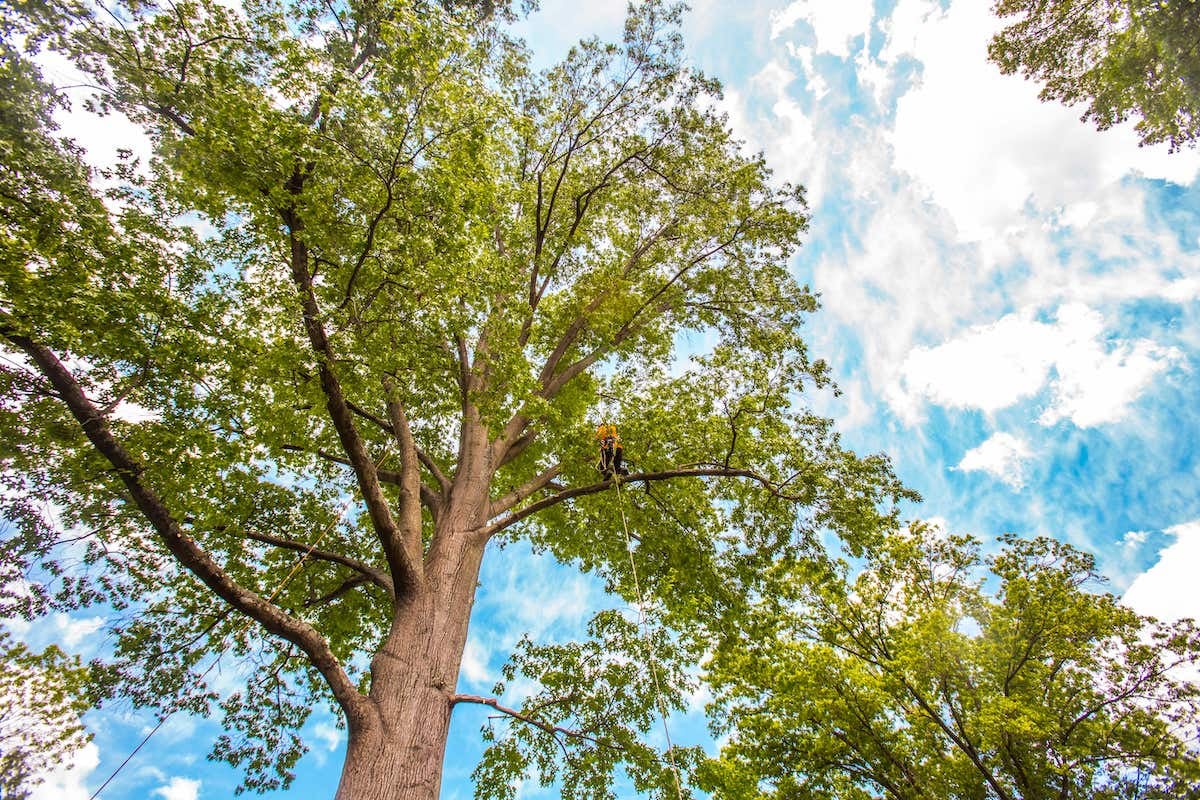
So what’s involved in basic tree care in Kentucky? How can you make sure that your trees stay on the right side of being healthy?
Louisville tree pruning, fertilization, mulching, and watering are four key areas where you can focus.
Tree pruning is one of the best things that you can do to promote good tree health. It involves removing diseased, dying, or dead branches that are adding stress to your tree. When you prune your trees regularly (and properly), you can help prevent the spread of disease (or decay), improve the structure of your tree, and encourage overall healthier growth.
Proper pruning is both an art and a science, but sometimes people underestimate how challenging it can be. While homeowners sometimes attempt DIY pruning, this is something that we would strongly advise against as there is a lot that can go wrong. It can also be dangerous if not performed correctly.
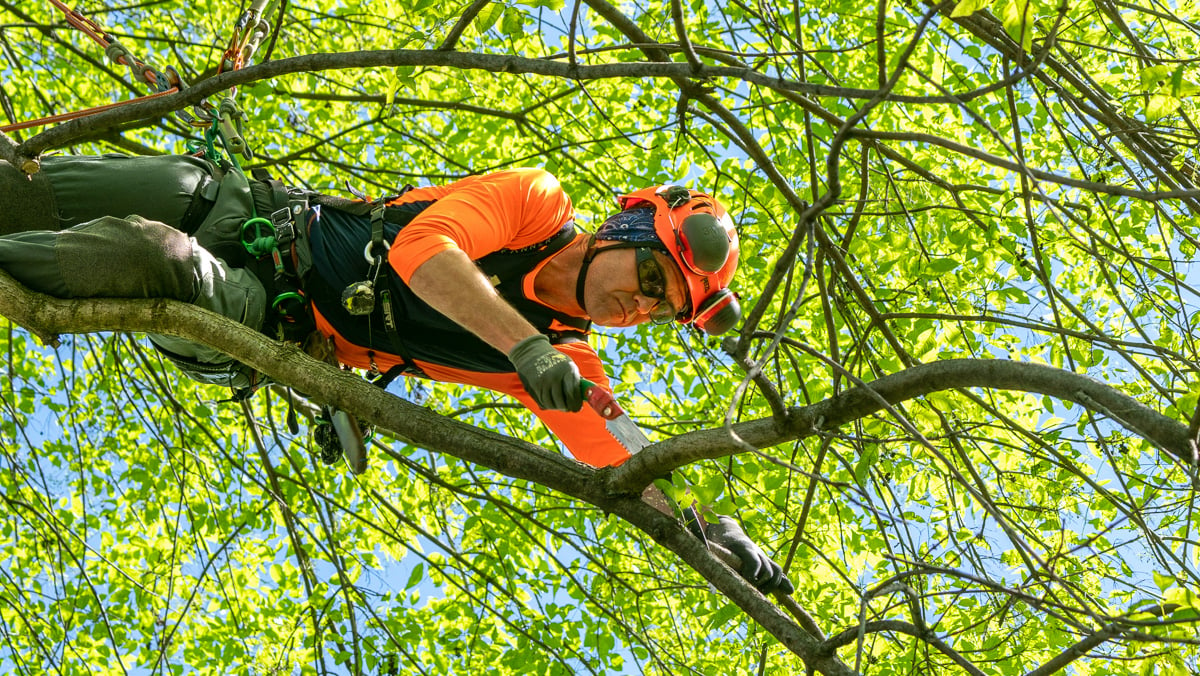
As we’ve mentioned, healthy trees are also receiving the proper amount of nutrients. But in the residential landscape, it’s likely that your soil is lacking. That’s where professional tree fertilization can help.
Tree fertilization provides important nutrients that can boost health and performance. Your trees and shrubs are only as healthy as the soil they’re growing in.
When trees are fertilized they typically grow stronger and healthier. They are also less likely to succumb to problems.

Another valuable step in preserving tree health is creating mulch rings around your trees. Mulch helps to insulate and protect roots. It also helps the soil to retain water. But the key to mulching is to avoid creating “mulch volcanoes.”
A mulch volcano is when mulch is mounded up against the trunk of the tree and then tapers down. This is unfortunately a common mulching habit even though it is incorrect. The proper way to create a mulch ring is to make a donut, with no mulch piled up against the trunk.
Trees, like all living things, need water to survive. If a tree isn’t receiving enough water, it can become dry and brittle. Leaves can start to change color and drop prematurely. Drought stress can take a serious toll on trees.
However, too much water can also lead to trouble like root rot and can fuel disease growth and spread. Signs of an overwatered tree include soggy soil, mushroom growth, moss, and yellowing leaves.
You probably want to know how often should I water my trees. The best way to figure this out is to pay attention to how much it rains. Trees require around one inch of water per week. You can buy a rain gauge which will measure how much rainfall your soil is getting. If it is falling short, you can supplement it with extra water.
Trees need to be watered slowly and steadily. They prefer a good soaking in which the water can percolate down to the roots. A slow-release watering bag is one possible way to achieve this.
The different seasons here in Kentucky can change the needs of your tree. Let’s look at tree care based on season.
Spring is the start of the growing season and a great time to enjoy the beauty of your green and blooming trees. Tree care in the spring includes the important tasks we talked about above like watering, mulching, and fertilization. Pruning can also be performed in the spring, though there are reasons why some trees are best pruned in the winter (which we’ll talk about).
Caring for trees during the summer definitely means keeping up with watering. During the hot and dry months of the summer, trees can begin to struggle. As we mentioned, healthy trees require around one inch of water per week. Pay attention to whether or not “Mother Nature” is supplying that. If not, you may need to supplement with some additional water.
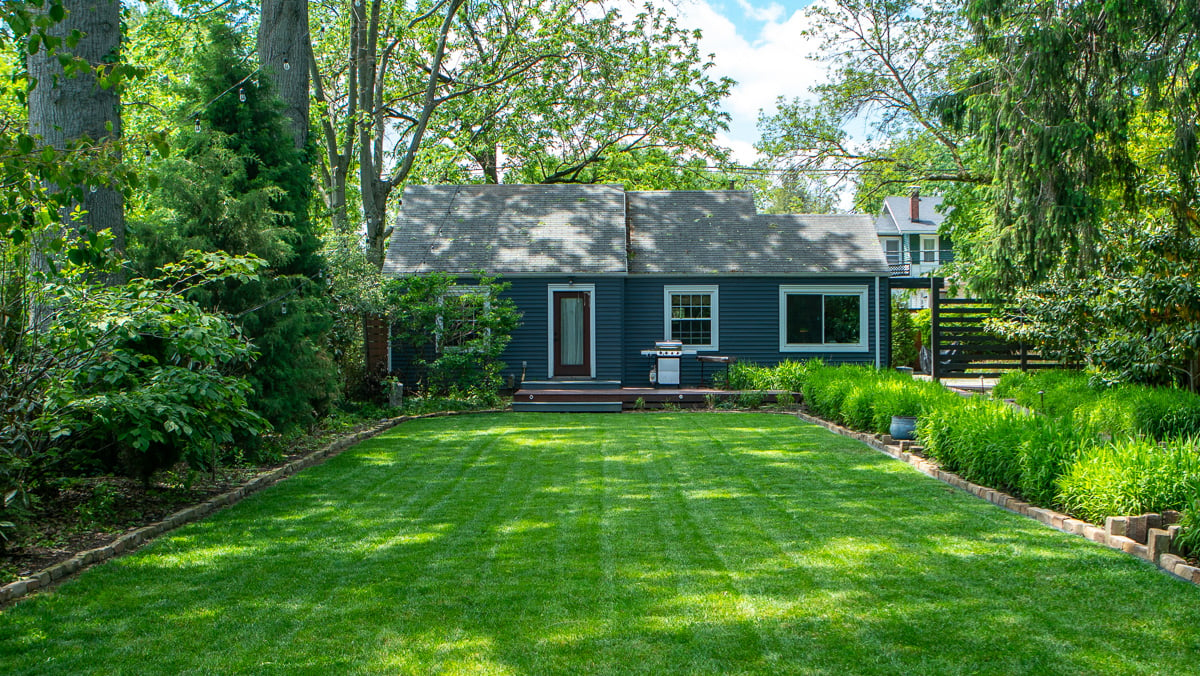
As summer comes to a close, temperatures will slightly cool and your deciduous trees may begin their changes in colors (and eventually start to lose leaves).
Tree fertilization is important in the fall as this is a time to prepare your trees for the coming winter. Your trees will benefit from that boost of nutrients as they head into the harsh winter season.
Trees still need water in the fall and if we have dry days, could need some extra help. But most of the time, Mother Nature is supplying more water. On top of that, most days, trees aren’t dealing with the intense heat that they are in the summer.
As we head into the winter months, this can be a good time to consider tree pruning (or what would be called “dormant pruning”). There is one great reason why the winter makes a good time for Louisville tree pruning: Deciduous trees have lost their leaves which makes it easier for an arborist to see potential structural problems within the tree.
Structural problems include “V” shaped unions, included bark, splits, and cracks in the trunk which may be more difficult to see when the leaves are present.
Unfortunately, trees can be subject to problems with diseases and pests in the landscape. It’s important to regularly have your trees assessed to look for early signs of trouble.
The residential landscape is full of potential tree pests that could end up damaging your trees. Here in Louisville, we have a number of different pests that can pose problems. Six that we see most often include bagworms, mites, emerald ash borer, aphids, scale, and other borer insects.
Tree pest control often depends on what you’re dealing with. Many pests do have specific treatment options that can help remedy the situation. However, if a tree is severely damaged by pests, it’s possible that it could be too far gone to fix.

Tree diseases are another potential problem that can pose a threat to tree health. There are more than 25 common diseases in the Louisville landscape. Most of these issues are related to various types of fungus.
There are tree disease treatment options for many diseases…but not all of them. And, if your tree has been severely ravaged by a disease, it might not recover. This behooves the importance of catching problems as early as possible.
One of the best ways to help improve tree health and prevent problems is with Plant Health Care.
Plant health care services combine fertilization, pest control, and disease control into a program that can help your trees fare better. In many cases, it can prevent problems in the first place.
If your tree is already dealing with a disease or pest, then we can look at treatment options that might be available (depending on what the issue is). As we mentioned, results often depend on how severely your tree has been impacted.

While we’ve covered tree basics, let’s talk a little bit about some of the more complex tree care needs that can arise.
One of those needs is tree cabling and bracing. Certain species of trees grow in a way, such as becoming V-shaped, which makes them a liability. Damage causing a split or crack in the tree can become problematic. However, trees can have these abnormalities and remain in overall good health. If that’s the case, cabling and bracing can be an effective solution.
Another tree care need that can arise is the need for growth regulators. These are products that can help slow the growth of certain trees (without stopping it entirely). This can be useful for trees that grow very quickly and run the risk of falling during storms.
Trees can also benefit from regular assessments by professional arborists in Louisville. A trained tree care expert is going to be able to spot problems early on and make proper diagnoses that will get you set up for success.
Problems are not always overtly noticeable to homeowners. When they are, it’s often that the problem has become severe. This is why working with a tree health expert can help ensure trees remain in good shape.
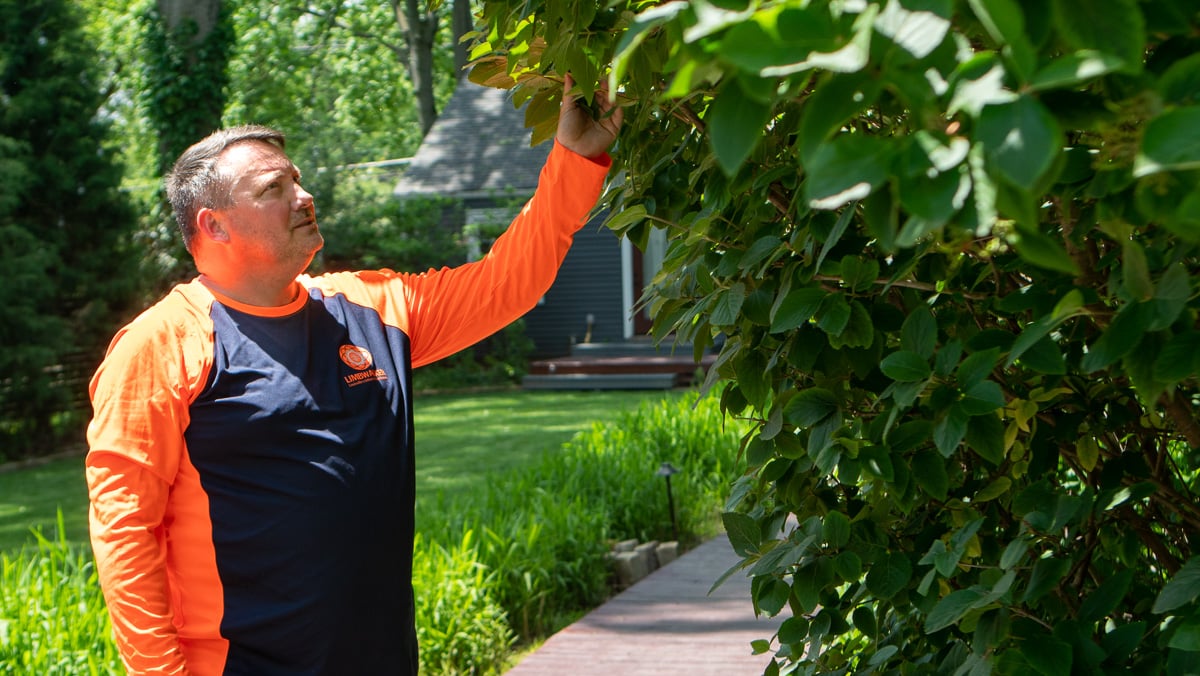
As a homeowner, there are important tree care tasks that you can be responsible for like watering and mulching. But in order to promote healthy trees, you also want to make sure that you are partnering with a pro.
Here are a few reasons why working with a pro is important.
Tree maintenance in Louisville can be complicated and you want to make sure that it’s done right. For instance, with a service like tree pruning, there is quite a bit of horticultural know-how that must be executed. When mistakes are made, you can do more harm than good.
You could actually end up preventing your tree from growing healthy and strong.
With a service like tree fertilization, you also want to make sure that you’re getting the best products as this will yield the best results. Those tree spikes sold at hardware stores are a waste of effort and money. You need professional fertilization services if you care about getting actual results.

There’s also risk involved in tree work, particularly more intense services like tree pruning (or tree removal, if your tree ends up needing it).
But a professional tree service in Louisville, KY will know how to get the job done correctly and safely. They will take all of the safety precautions necessary to avoid accidents. A mistake can truly be detrimental in this field.
Finally, you also have to consider the fact that you probably don’t have a lot of free time to handle tree care. While you can tackle occasional watering and mulching, you don’t have time to prune trees or perform fertilization services.
After all, we only have so many hours in a day…and so many free weekends. Most people would rather spend that free time with their family than working on their landscape.

When it comes to getting the best tree maintenance in Louisville, it is important that you are choosing wisely with tree care services. To do this, you’ll need to take some time to do your research and find a company that is going to best suit your needs.
What services do you need to have done and how can a professional help you?
As you spend time on different tree care companies’ websites, look for ones that employ Certified Arborists and other tree care experts who have in-depth experience with trees.
You can also take time to look at reviews about any company you are considering. Social proof is always a great way to back up a tree care company’s claims. You want to choose a company that has satisfied customers so that you can ensure you’ll end up with healthy trees.
All of this is important as you want to avoid “fly-by-night” companies and those that don’t have the true expertise to be performing this type of work. You should not hesitate to reach out to any company that you are considering and ask any questions that you have. How they communicate during this stage of the research process will give you a sense of what it will be like to work with them after you’ve hired them.

Hopefully, these tree care tips for Louisville homeowners have helped give you a sense of what’s involved in caring for trees.
When you make a wise choice in tree services, the process can be simplified for you.
With the right company, you’ll ensure your trees are getting the proper care all year long. As you can tell from this guide, different times of the year can mean different needs for your trees. But a tree care expert will know exactly what’s needed.
At Limbwalker, we are committed to preserving the health and beauty of trees here in Kentucky. We got into this industry because we truly love trees. We know that they serve many valuable purposes and we want to do what we can to help homeowners enjoy them for many years to come.
Depending on your tree needs, we can customize your tree care in Louisville, KY to fulfill everything you need. That means less worries on your end and more time to enjoy your property to the fullest.
If you’d like to learn more about tree services for your Louisville home, get in touch, get your quote, and get back to enjoying your yard.


